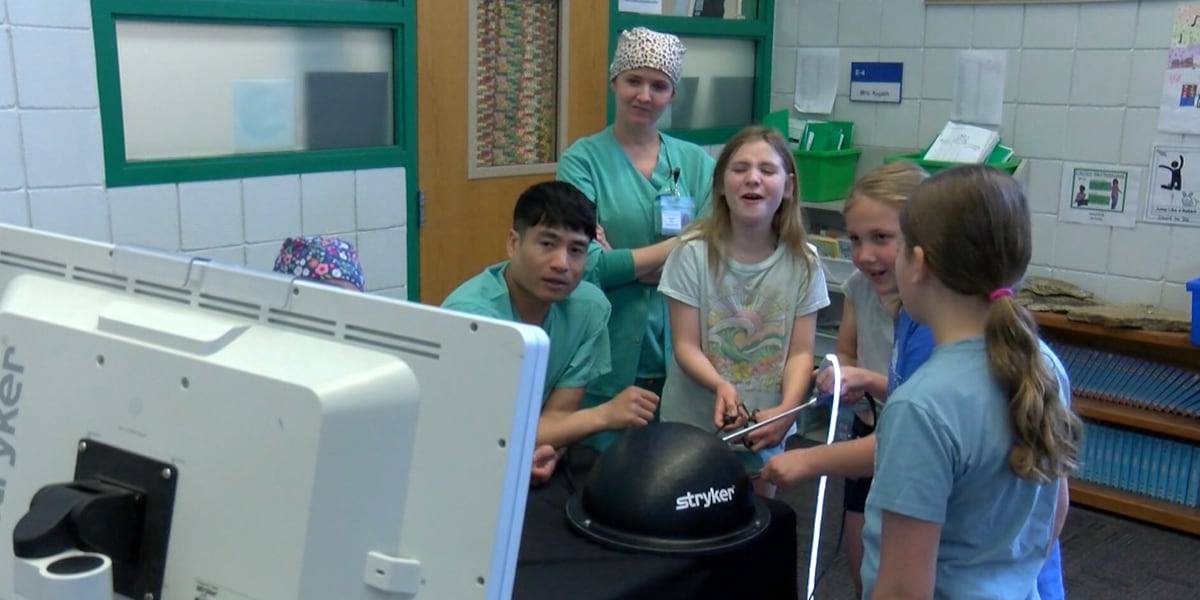Face to Face with Science: Why Lifelike Digital Personas Might Win Your Trust
Science
2025-04-15 04:00:01
In the vibrant world of TikTok, a fascinating trend has emerged that blends historical education with digital creativity. Imagine legendary scientists like Nikola Tesla and Marie Curie coming to life through short, captivating video messages that are capturing the imagination of millions. These innovative "testimonial" videos transform complex scientific concepts into bite-sized, entertaining content that resonates with a younger, tech-savvy audience. These digital resurrections of scientific pioneers are more than just novelty—they represent a groundbreaking approach to science communication. By leveraging the platform's viral potential, these videos are breaking down barriers between historical knowledge and contemporary learning. Users are not just passively consuming content; they're actively engaging with scientific history in a way that's both informative and incredibly entertaining. The phenomenon highlights the power of social media to democratize education, making complex scientific narratives accessible and exciting for a global audience. As these videos continue to gain traction, they're proving that learning can be dynamic, fun, and instantaneously shareable in the digital age. MORE...
Unsinkable Myth Shattered: The Shocking Scientific Secrets Behind the Titanic's Fatal Voyage
Science
2025-04-15 03:43:49
On the fateful night of April 14, 1912, a rare atmospheric phenomenon may have played a crucial role in the Titanic's tragic destiny. A thermal inversion created the perfect conditions for a superior mirage, potentially obscuring the true horizon and hiding deadly icebergs from the ship's watchful eyes. This atmospheric trick of light could have been the silent accomplice in one of maritime history's most devastating disasters, casting a deceptive veil over the dangerous waters that would ultimately seal the ship's fate. MORE...
Campus Innovation Meets Hollywood: UWL Science Hub and Film Dreams Spark Legislative Buzz
Science
2025-04-15 03:32:00
Local lawmakers are gearing up to champion an exciting new scientific endeavor for the University of Wisconsin-La Crosse. State Senator Brad Pfaff and Representative Jill Billings recently engaged with community members at a public listening session held at the Main Street Library, discussing the promising Prairie Springs science center project. The proposed science building represents a significant potential investment in educational infrastructure and research capabilities for the region. During the session, Pfaff and Billings outlined the project's vision, highlighting its potential to enhance scientific education and research opportunities for students and faculty at UW-La Crosse. Community members were invited to learn more about the proposed science center and share their perspectives on this transformative educational initiative. The lawmakers' proactive approach demonstrates their commitment to supporting educational advancement and innovation in the La Crosse area. As legislative discussions continue, the Prairie Springs science center project remains a key priority for local representatives seeking to strengthen the region's educational landscape. MORE...
Tech Titans Converge: Alabama's Bold Move to Revolutionize Computer Science Education
Science
2025-04-15 02:44:47
In a powerful display of collaborative vision, key stakeholders from across the educational landscape converged at the Computer Science Summit on Monday. Students, passionate educators, and state leadership united with a shared mission: to dramatically expand and enhance computer science education opportunities throughout schools statewide. The summit served as a critical platform for discussing innovative strategies to integrate cutting-edge technology curriculum into classrooms, ensuring students are equipped with the digital skills necessary for future success. Participants explored ways to break down barriers, increase access to computer science programs, and prepare the next generation of tech-savvy professionals. By bringing together diverse perspectives from students, teachers, and policymakers, the event highlighted the growing importance of computer science education in preparing young learners for an increasingly digital world. MORE...
Local Teen Genius Shatters Science Competition, Clinches Prestigious National Award
Science
2025-04-15 01:55:50
In a groundbreaking fusion of cutting-edge technology and astronomical exploration, Matteo Paz has emerged as a rising star in scientific innovation. This talented Pasadena High School senior has captured the top prize in the prestigious Regeneron Science Talent Search by developing an extraordinary machine learning system capable of classifying celestial objects with remarkable precision. Paz's remarkable project seamlessly blends the complex worlds of artificial intelligence and astronomy, demonstrating an impressive ability to apply advanced computational techniques to scientific research. By creating an intelligent classification system, he has not only showcased his technical prowess but also opened new possibilities for understanding the vast mysteries of our universe. The young scientist's achievement highlights the incredible potential of student researchers to push the boundaries of scientific discovery. His innovative approach represents a promising glimpse into how emerging technologies can revolutionize our understanding of astronomical phenomena, proving that groundbreaking research is not limited by age or traditional academic boundaries. MORE...
Unsolved Mystery: The Lingering Shadows of Nongjian Tao's Controversial Death
Science
2025-04-15 01:00:11
In the complex landscape of academic research and international tensions, a tragic story has emerged surrounding the death of a Chinese researcher. During the heightened scrutiny of the China Initiative era, a police report revealed that the researcher, identified as Tao, died by suicide, with investigators pointing to overwhelming work-related stress as a critical factor. The circumstances surrounding Tao's death highlight the immense pressures faced by researchers in an increasingly challenging academic environment. The China Initiative, a controversial program that cast a wide net of suspicion over Chinese academic and research communities, created a climate of intense professional and personal strain. The police report's conclusion underscores the profound mental health challenges that can emerge when professional expectations and external pressures converge. Tao's story serves as a poignant reminder of the human cost hidden behind academic and geopolitical tensions, revealing the deeply personal impact of broader systemic challenges. While the specific details remain sensitive, the incident prompts critical conversations about workplace support, mental health resources, and the need for compassionate approaches in high-stress research environments. MORE...
Space Under Siege: Maryland Lawmakers Mobilize to Defend NASA's Scientific Lifeline
Science
2025-04-15 00:04:25
Maryland's congressional representatives are standing firm against proposed NASA budget cuts, expressing strong optimism that Congress will ultimately protect critical scientific research and space exploration initiatives. The delegation is particularly concerned about potential reductions that could compromise the state's significant aerospace and scientific research capabilities. In a united front, lawmakers argue that maintaining robust NASA funding is essential not just for scientific advancement, but also for maintaining the United States' competitive edge in space exploration and technological innovation. The proposed cuts, which could potentially impact key research programs, have raised alarm among scientists and space industry professionals. The representatives emphasize that NASA's scientific missions are crucial for understanding our universe, driving technological progress, and inspiring future generations of scientists and engineers. They are committed to defending the agency's budget and ensuring that America continues to lead in space research and exploration, especially in the context of growing international competition. MORE...
Brain-Tech Startup Storms Silicon Valley: $104M Funding Signals Neuralink Showdown
Science
2025-04-14 23:54:34
In a groundbreaking move for neurotechnology, Science Corp. has secured an impressive $100 million in funding, marking a significant milestone for the brain-focused startup. Led by Khosla Ventures, this substantial investment highlights the growing interest in cutting-edge neuroscience research. The company, founded by Max Hodak—a co-founder of the renowned Neuralink Corp.—is poised to push the boundaries of brain-related technological innovation. Hodak's track record and the substantial financial backing suggest that Science Corp. is positioned to make remarkable advances in understanding and potentially enhancing human brain capabilities. This funding round not only validates the company's promising approach but also signals the tech industry's increasing commitment to exploring the complex and fascinating world of neurotechnology. As Science Corp. continues to develop its groundbreaking research, the scientific community and investors alike are watching with keen anticipation. MORE...
Science Sparks Snuffed: Budget Cuts Silence Young Explorers' Classroom Adventures
Science
2025-04-14 23:45:51
In a significant financial setback, the Hitchcock Center in Amherst has experienced a substantial loss of grant funding, totaling approximately $583,000 over the past fortnight. The unexpected reduction in financial support threatens to impact the center's ongoing environmental education and conservation programs, potentially disrupting its critical work in the community. The sudden grant withdrawal highlights the challenging funding landscape that many nonprofit environmental organizations currently face. Despite this financial blow, the Hitchcock Center remains committed to its mission of environmental education and sustainability, seeking alternative funding sources to bridge the unexpected budget gap. Local supporters and community members are encouraged to stay informed about the center's efforts to maintain its vital educational and conservation initiatives during this challenging period. MORE...
Science Under Siege: Democrats Blast Trump's Radical Budget Slashing Plan
Science
2025-04-14 23:25:35
Maryland officials are sounding the alarm over a potential privatization scheme that could dramatically reshape two of the nation's most critical climate research institutions: NOAA and NASA. The proposed plan threatens to dismantle the longstanding public scientific infrastructure that has been instrumental in understanding climate change and environmental dynamics. As federal agencies that have been at the forefront of climate research and environmental monitoring, NOAA and NASA represent crucial pillars of scientific understanding. Their work has provided invaluable insights into global climate patterns, weather systems, and environmental transformations. Now, these agencies find themselves in the crosshairs of a privatization strategy that could fundamentally alter their mission and operational capabilities. State officials in Maryland are particularly concerned about the potential implications. The proposed privatization could not only compromise the agencies' scientific independence but also potentially redirect critical research funding away from public interest and toward private sector interests. This development raises serious questions about the future of climate science and environmental research in the United States. The potential privatization represents more than just an administrative shift; it signals a potentially profound change in how scientific research is conducted and funded. Maryland's leadership sees this as a critical moment that could have far-reaching consequences for scientific integrity, public knowledge, and environmental understanding. MORE...
- 1
- 2
- 3
- 4
- 5
- 6
- 7
- 8
- 9
- 10
- 11
- 12
- 13
- 14
- 15
- 16
- 17
- 18
- 19
- 20
- 21
- 22
- 23
- 24
- 25
- 26
- 27
- 28
- 29
- 30
- 31
- 32
- 33
- 34
- 35
- 36
- 37
- 38
- 39
- 40
- 41
- 42
- 43
- 44
- 45
- 46
- 47
- 48
- 49
- 50
- 51
- 52
- 53
- 54
- 55
- 56
- 57
- 58
- 59
- 60
- 61
- 62
- 63
- 64
- 65
- 66
- 67
- 68
- 69
- 70
- 71
- 72
- 73
- 74
- 75
- 76
- 77
- 78
- 79
- 80
- 81
- 82
- 83
- 84
- 85
- 86
- 87
- 88
- 89
- 90
- 91
- 92
- 93
- 94
- 95
- 96
- 97
- 98
- 99
- 100
- 101
- 102
- 103
- 104
- 105
- 106
- 107
- 108
- 109
- 110
- 111
- 112
- 113
- 114
- 115
- 116
- 117
- 118
- 119
- 120
- 121
- 122
- 123
- 124
- 125
- 126
- 127
- 128
- 129
- 130
- 131
- 132
- 133
- 134
- 135
- 136
- 137
- 138
- 139
- 140
- 141
- 142
- 143
- 144
- 145
- 146
- 147
- 148
- 149
- 150
- 151
- 152
- 153
- 154
- 155
- 156
- 157
- 158
- 159
- 160
- 161
- 162
- 163
- 164
- 165
- 166
- 167
- 168
- 169
- 170
- 171
- 172
- 173
- 174
- 175
- 176
- 177
- 178
- 179
- 180
- 181
- 182
- 183
- 184
- 185
- 186
- 187
- 188
- 189
- 190
- 191
- 192
- 193
- 194
- 195
- 196
- 197
- 198
- 199
- 200
- 201
- 202
- 203
- 204
- 205
- 206
- 207
- 208
- 209
- 210
- 211
- 212
- 213
- 214
- 215
- 216
- 217
- 218
- 219
- 220
- 221
- 222
- 223
- 224
- 225
- 226
- 227
- 228
- 229
- 230
- 231
- 232
- 233
- 234
- 235
- 236
- 237
- 238
- 239
- 240













